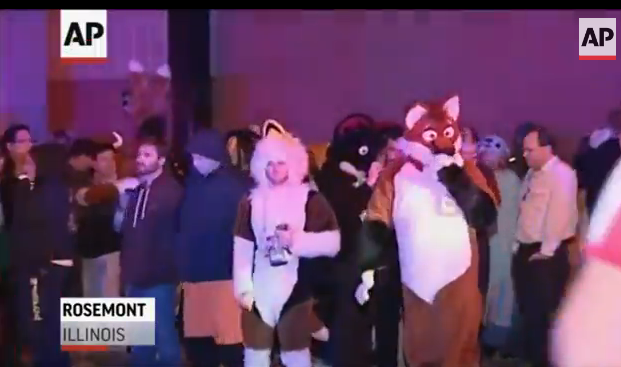The Dominant Life Form in the Cosmos Is Probably Superintelligent Robots
We are the bootloader.
“As soon as a civilization invents radio, they’re within fifty years of computers, then, probably, only another fifty to a hundred years from inventing AI,” Shostak said. “At that point, soft, squishy brains become an outdated model.”
The rise of the hashgag
Jason Porath:
If you’ve seen Big Hero Six, chances are that one of the things that stuck with you was Baymax’s “balalala” fist bump. You can see the exact moment in the YouTube clip above. Most people saw that and just laughed at the silliness of it.
Me, I set my watch.
Upon first seeing it, I guessed (correctly) that exact gag would be repeated 2-3 more times in the movie, depending on how well the test audiences had enjoyed it. They would be spaced out for maximum effect, at 20 minute intervals. And that it would be seized upon by the marketing department, either in the trailers themselves, the TV ads, or a twitter campaign (it was, as you can tell by the above video). I even guessed that it was inserted fairly late in production (which, best I can tell from what my Disney friends have said, is also true). I would not be surprised if it was one of many such moments that were tested out.
But it feels so good! See also Ohrwurm, and animated movies are just the first to get it, it will be coming to all media soon.
The year in media errors and corrections 2014
Philadelphia Daily News:
In yesterday’s “Chillin’ Wit” column, a fond farewell to former Daily News editor Zack Stallberg as he heads west to New Mexico, Stallberg was misquoted as using the term “horse manure.” He responded: “I demand a correction. Does anyone really think I would use the word ‘manure’?” No. Stall berg actually said, “horse s—-.” And that’s no bull manure.
Why String Theory Still Offers Hope We Can Unify Physics
Brian Greene in Smithsonian Magazine:
In October 1984 I arrived at Oxford University, trailing a large steamer trunk containing a couple of changes of clothing and about five dozen textbooks. I had a freshly minted bachelor’s degree in physics from Harvard, and I was raring to launch into graduate study. But within a couple of weeks, the more advanced students had sucked the wind from my sails. Change fields now while you still can, many said. There’s nothing happening in fundamental physics.
Then, just a couple of months later, the prestigious (if tamely titled) journal Physics Letters B published an article that ignited the first superstring revolution, a sweeping movement that inspired thousands of physicists worldwide to drop their research in progress and chase Einstein’s long-sought dream of a unified theory. The field was young, the terrain fertile and the atmosphere electric. The only thing I needed to drop was a neophyte’s inhibition to run with the world’s leading physicists. I did. What followed proved to be the most exciting intellectual odyssey of my life.
That was 30 years ago this month, making the moment ripe for taking stock: Is string theory revealing reality’s deep laws? Or, as some detractors have claimed, is it a mathematical mirage that has sidetracked a generation of physicists?
19 hospitalized at furry convention due to “seemingly intentional” gas leak
“It was shocking,” a man standing outside the hotel dressed in a red panda animal suit told the Tribune, noting that he and other guests did not hear an alarm but rather found out that they had to evacuate from hotel staff and texts.
Why Officer Darren Wilson wasn't indicted
Doug Wyllie at PoliceOne:
The facts of the case showed that under Missouri law — and in accordance with Supreme Court precedent — Officer Wilson was justified in shooting Michael Brown.
In fact, compared to other police use-of-force cases, this incident was pretty simple and pretty easy to evaluate. Under Missouri law, a police officer is authorized to use force in self-defense (when in fear of death or great bodily harm to himself or another person) and to effect an arrest or prevent escape under certain prescribed conditions
Will We Build Colonies That Float Over Venus Like Buckminster Fuller's "Cloud Nine"?
Robert Walker at Science 2.0:
This idea dates back to the Russians in the early 1970s. The surface of Venus is far too hot, and the atmosphere too dense, for Earth life. However, our air is a lifting gas on Venus with about half the lifting power of helium on Earth. A habitat filled with normal air will float high in the dense Venus atmosphere, The atmospheric pressure there is the same as Earth sea level (1 bar). Temperatures are perfect for Earth life too, just over 0°C.
Also, just as weather balloons naturally rise to their operating level high in our atmosphere - so it works in the same way for our habitats on Venus. They float at a level where the pressure is equal inside and out, and can be of light construction. It is arguably the most hospitable region for humanity in our solar system, outside of Earth itself.
Man Finds Needle In Haystack
Two things; no this is not an Onion link. And how great is it that there is a news outlet called “modern farmer”, that reports on wonderful things like this?
Artist Sven Sachsalber has accomplished much in his career as a conceptual artist, from surviving a performance in which he ate poisonous mushrooms to spending 24 hours with a cow. But his latest is a non-metaphoric metaphoric triumph: he has found a needle in a haystack.
Toshiba’s high-tech grow rooms are churning out lettuce that never needs washing
Dan Frommer in Quartz:
Toshiba, the Japanese technology conglomerate with a lineage dating back to the 19th century, is looking for growth in a whole new way. In a sterilized clean room about 35 miles outside of Tokyo, where Toshiba used to make floppy disks in the 1980s and 90s, the company is now starting to grow thousands of lettuce plants as it expands into indoor agriculture.
The Dreadful Inconvenience of Salad
Olga Khazan in The Alantic:
At a drab community center on Chicago’s West side, there’s a room where families sit around idly. Unemployment is high here, and so is crime: Last month, East Garfield Park was ranked the seventh most violent out of 77 Chicago neighborhoods. The center offers everything from domestic-violence help, to financial assistance, to warmth during the long winter.
It also offers salads, which visitors can purchase from a futuristic-looking vending machine. The salads are made from high-end ingredients like blueberries, kale, fennel, and pineapple. Each one comes out in a plastic mason jar, its elements all glistening in neat layers, the way fossils might look if the Earth had been created by meticulous vegans.
She finally gets there: “It’s not the money, it’s the time.” I’m sick of rich people wondering why poor people eat shit food. Duh.
People think their opponents are hate-filled—unless you pay them money
John Timmer at Ars:
The hypothesis focused on the motivation for continuation of the conflict. Individuals on any side of it will believe that their own group is driven to work together by love of each other. They’ll refuse to recognize that same love in their opponents, instead assuming that the opposition is driven by hatred. That hatred, naturally, is directed at your own group. By assuming your opponents have an intractable negative bias against you, you end up with no desire to work with the opposition and pessimism about the prospects for any compromise. “If adversaries believe inflexibility on the other side renders mutual compromise impossible, they will be unlikely to adopt seemingly rational strategies for conciliation,” as the authors put it.
To test this, the authors surveyed both US citizens about the Democrat-Republican divide, and Israelis and Palestinians about their conflict. In general, their hypothesis held up well. Most groups felt that their own members were motivated by love of each other, while the opposition was united in their hatred of the survey subjects.
To quantify the negativity, the authors measured the relative bias between how much individuals ascribed mutual love to their opponents and how much they ascribed hatred to them. The strength of this bias correlated with a reduced willingness to negotiate, reduced perception that a favorable compromise could be reached, and other measures of optimism. In short, once you’re convinced your opponents hate you, then future prospects start to look bleak.
Is there a way out of this morass? Since money makes the world go around, the authors decided to try a small payment. They told a group of US participants that they’d give them $12 if their evaluation of their opponents’ motivations matched the value their opponents gave for themselves. In other words, if a Democrat gave Republicans a self-love/opponent-hate rating that matched the one Republicans gave themselves, they’d get $12.
The goal wasn’t really to harness greed; rather, it was simply to get people to stop and think of their opponents more carefully—to view them as humans, rather than some generic “other.” To an extent, it worked. Simply offering the payment reversed the general trend, with people ascribing more self-love than other-hate to their opponents.
It would be easy to dismiss this as participants simply matching what they’d expect their opponents to say in order to get some money. But this change had the effect of reducing the bias score the authors calculated above. And they again showed that bias correlated with pessimism about compromise, a sense that a win-win agreement wasn’t possible, and a tendency to assume that the opposition’s opinions were an essential part of their nature. By reducing this bias, the small payment made people more open to the idea of compromise.
Paper is here.
What if Age Is Nothing but a Mind-Set?
Bruce Grierson in the NYT Magazine:
One day in the fall of 1981, eight men in their 70s stepped out of a van in front of a converted monastery in New Hampshire. They shuffled forward, a few of them arthritically stooped, a couple with canes. Then they passed through the door and entered a time warp. Perry Como crooned on a vintage radio. Ed Sullivan welcomed guests on a black-and-white TV. Everything inside — including the books on the shelves and the magazines lying around — were designed to conjure 1959. This was to be the men’s home for five days as they participated in a radical experiment, cooked up by a young psychologist named Ellen Langer.
The subjects were in good health, but aging had left its mark. “This was before 75 was the new 55,” says Langer, who is 67 and the longest-serving professor of psychology at Harvard. Before arriving, the men were assessed on such measures as dexterity, grip strength, flexibility, hearing and vision, memory and cognition — probably the closest things the gerontologists of the time could come to the testable biomarkers of age. Langer predicted the numbers would be quite different after five days, when the subjects emerged from what was to be a fairly intense psychological intervention.
Andreas Dalsgaard - ReDane
Today I discovered Andreas Dalsgaard via a very interesting docu called Bogota Change. Unfortunately I can’t find a decent copy on the web, though if you speak Spanish (or read Danish) this one will work. He does have a new film coming out soon on the same subject, so will be watching for that. In the meantime, have this short on food/factory farming/bio diversity:
David Fincher - And the Other Way is Wrong
Tony Zhou Every Frame a Painting:
For sheer directorial craft, there are few people working today who can match David Fincher. And yet he describes his own process as “not what I do, but what I don’t do.” Join me today in answering the question: What does David Fincher not do?
Thirteen Ways of Looking at Greg Maddux
Not what you think it is:
Jeremy Collins in SB Nation:
On the mastery of Greg Maddux, the tragedy of losing a best friend, and how the two will be forever connected.




